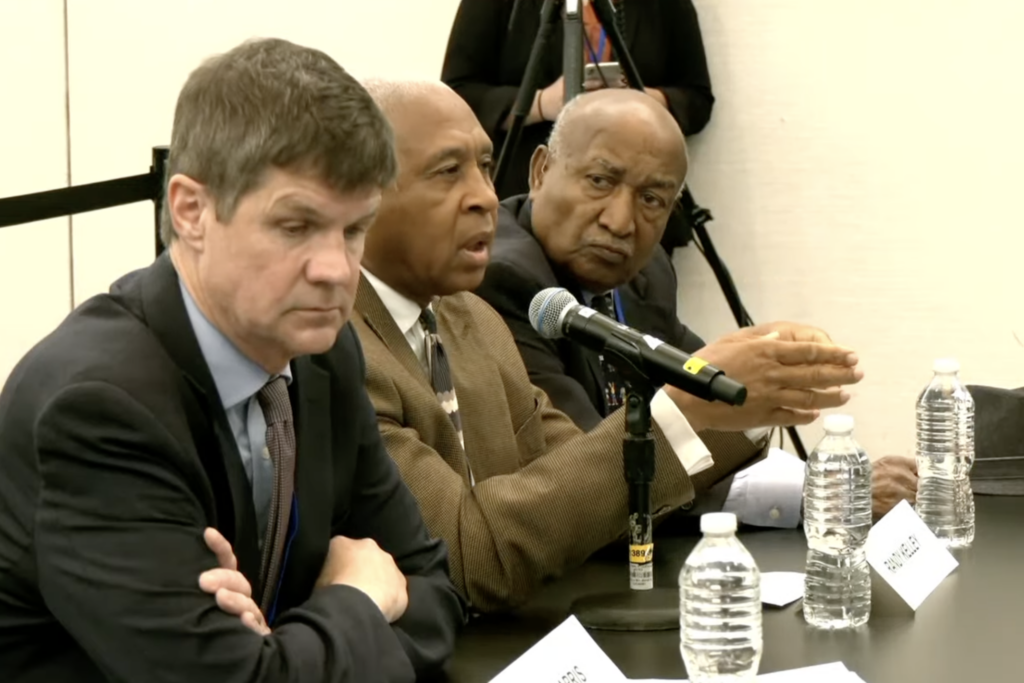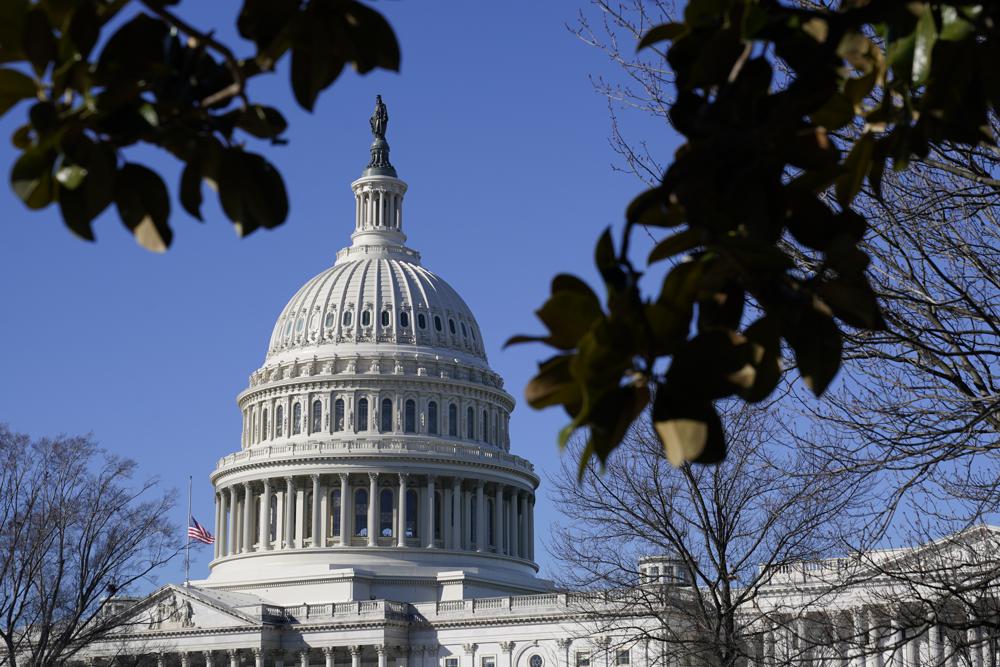DNC gives Alabama Democrats February deadline to pass new bylaws

by Alander Rocha, Alabama Reflector The Democratic National Committee will give the Alabama Democratic Party a chance to resolve a divisive battle over the rules and governance of the state party on its own. The DNC’s Rules and Bylaws Committee (RBC) Friday gave ADP Chair Randy Kelley a November 28 deadline to develop new bylaws and provide the DNC a list of members of the State Democratic Executive Committee (SDEC), the party’s governing body. The RBC ordered the party to hold a vote on the bylaws by Feb. 1, 2024. A resolution authorizing the action added that the RBC may take necessary action to enforce the resolution, “including but not limited to the appointment of DNC representatives.” Kim Keenan, a lawyer charged with overseeing a Sept. 8 hearing on the party dispute, said the battles stemmed from longstanding issues of representation within the state party. “I like to say that what happened here is a perfect storm of the faraway past and the near past, basically colliding with the present,” she said. Ben Harris, an attorney and ADP’s vice chair for county affairs and a lawyer, said Kelley and Vice Chair for Minority Affairs Joe Reed were prepared to pass amended bylaws that “satisfied the DNC’s requirements,” with the at-large members who were previously denied a vote. He stressed that he feels it’s important that the party come to a voluntary agreement by working together. “We need the opportunity to reach that by agreement, and not by one side winning and one side losing. We’ve had too much of that,” Harris said. A controversial May meeting The ADC in May adopted a new set of bylaws that abolished three diversity caucuses set up under bylaws adopted by the party in 2019 and reduced the power of other diversity caucuses. The 2019 bylaws emerged after a fight between Reed and then-U.S. Sen. Doug Jones over control of the party. The DNC that year ordered the party to create caucuses reflecting the diversity of the state Democratic electorate. Reed’s group opposed the bylaws, saying they unfairly reduced the power of Black voters, who provide most of the Democratic support in the state. Kelley, a Reed ally, was elected chair of the party in August 2022. The May meeting was tumultuous, and members of the affected caucuses, some of whom are Black, sharply criticized the moves, saying they stripped key groups of representation. Another complaint came over a $50 qualifying fee charged by party officials to enter the meeting, which several SDEC members said they had not been informed about previously and which some called a poll tax. ADP members opposed to the new rules soon filed complaints with the DNC. Keenan said during the RBC hearing Friday she found two issues at the heart of the conflict between the two factions of the party. The qualifying fee, she said, was a barrier to participation in the May meeting, but she doesn’t believe it was imposed for “nefarious” reasons. “People on both sides had paid the fee, but unfortunately the fee didn’t have any rule support or any objective support,” Keenan said. “So in effect, it was alleged to be a poll tax, and it does follow what happens when you have a poll tax — you cannot participate unless you pay the fee.” She said that was the “fatal flaw” in the vote on the new bylaws. While requiring the fee may not have been ill-intentioned, Keenan said, denying participation is not consistent with DNC rules. Keenan also said she could not find anything in the existing bylaws to support the fee. “Preventing that number of people from participating was probably the difference between those May bylaws passing,” Keenan said. ‘A lot of self-determination’ Keenan also said that turning diversity caucuses — youth, LGBTQ+, Native American, disabled, and Hispanic — into committees while maintaining the Minority Caucus, representing Black Democrats, was an issue. “Caucuses have a lot of self-determination ability. They are able to do things. They are able to choose their members. They’re able to move forward in a way where they have determination over who their members are and whose appointed and who’s added,” Keenan said. “But once you become a committee, that right is delegated off to the Executive Committee.” ADP’s position, she said, stems from a “unique history where Black Alabama Democrats really had to sue, protest and be activistic to get the equity that they deserved in the party.” Hawthorne v. Baker, a 1990 case which allowed Black Democrats to have self-determination, a federal court said that unless a group meets the standard that Black Democrats met, they can’t be a caucus. “And I think that’s I think that that’s mixing an apple with an orange,” Keenan said. Kelley, who attended the Friday hearing, said during the meeting he wanted to “heal and move the party forward.” In an interview after the meeting, he said the resolution was reasonable, and that the meeting “came out as well as I thought it would.” “We don’t have a problem whatsoever with changing the bylaws,” Kelley said. Kelley added that he was pleased that the hearing report found what he referred to as misinformation regarding the $50 qualifying fee, which has been characterized as a poll tax. “It was a good forum to clarify that,” Kelley said, adding that it’s been in existence for at least 30 years. ADP Vice Chair Tabitha Isner, one of the challengers, said in a text after the meeting that she appreciates the DNC trying to find a solution that is collaborative. “The challengers have been fighting for a seat at the table, and the RBC has said that we must be granted one,” she wrote. “I look forward to hearing how the DNC intends to provide the necessary oversight to this process.” Reed, who was also in attendance, took a more forceful approach and said “this issue comes down to one fundamental issue and is rooted in racism.” “There’s nothing in Alabama we’ve
Congressional Budget Office says inflation to last into 2023

The Congressional Budget Office released an economic outlook Wednesday, saying that high inflation will persist into next year, likely causing the federal government to pay higher interest rates on its debt. The nonpartisan agency expects that the consumer price index will rise 6.1% this year and 3.1% in 2023. This forecast suggests that inflation will slow from current annual levels of 8.3%, yet it would still be dramatically above a long-term baseline of 2.3%. The 10-year estimates do contain positive news as this year’s annual budget deficit will be $118 billion lower than forecasted last year. That’s a byproduct of the end of pandemic-related spending and the solid job growth it helped to spur. As a share of the total economy, publicly held debt will drop through 2023. Still, the accumulated federal debt will likely continue to grow over the next decade to be equal to roughly 110% of U.S. gross domestic product. The Federal Reserve has been trying to reduce inflation by raising its benchmark interest rates, causing the interest charged on 10-year U.S. Treasury notes to increase substantially in recent months. One consequence is that the government will be spending more money this year to service its debt. By 2032, the yearly interest payments will nearly be $1.2 trillion, or more than what the federal government spends on defense. Still, the CBO cautions that its numbers “are subject to considerable uncertainty, in part because of the ongoing pandemic and other world events,” including Russia’s ongoing war in Ukraine. The report accounts at least for the first few months of the war, according to CBO. Economists have said coronavirus relief programs issued by both the Biden and Trump administrations have contributed to higher inflation levels. But high prices have also been fueled by a delay in action by the Fed, supply chain disruptions, and the tumult produced after Russia invaded Ukraine in February. Ben Harris, the Treasury Department’s assistant secretary for economic policy, tweeted on Tuesday that the factors driving inflation also include soaring corporate profits, driven by a lack of business competition — as well as businesses not being fully prepared for the reopening of the economy as pandemic restrictions were lifted. The administration has emphasized that its plan put the U.S. economy into a stronger place relative to the rest of the world because unemployment is a low 3.6%. “The American Rescue Plan has fostered an extraordinarily fast recovery and leaves us in a strong position to address the global challenges posed from supply chains and the economic fallout from Russia’s invasion of Ukraine,” he tweeted. The report says beyond 2032, “if current laws remained generally unchanged, deficits would continue to grow relative to the size of the economy over the following 20 years, keeping debt measured as a percentage of GDP on an upward trajectory throughout that period.” Maya MacGuineas, president of the Committee for a Responsible Federal Budget, told The Associated Press ahead of the release that the pandemic, war in Ukraine, and other factors point to the importance of reducing the annual deficit. “Unfortunately, the underlying story here is one of fiscally unsustainable positions, and on top of that, we have this added challenge of inflation and a reminder that external shocks continue to come at us,” she said. Republished with the permission of The Associated Press.


